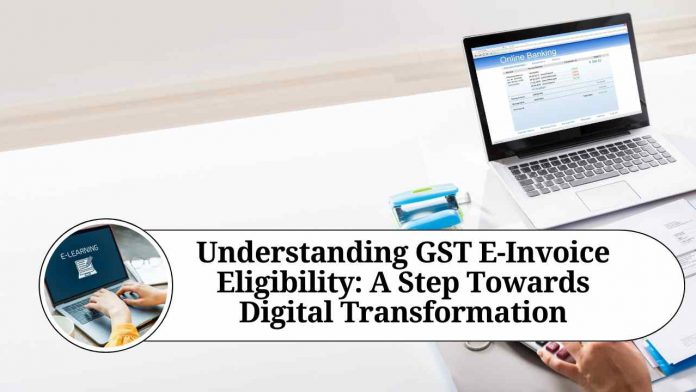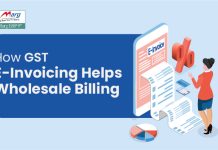Recent Updates on e-Invoicing:
10th May 2023
The CBIC’s latest action to support the government’s objective of shifting to a digital economy involves the introduction of the 6th phase of e-invoicing. Starting from August 1st, 2023, businesses with an annual turnover of ?5 crore or higher since 2017-18 will be obligated to generate e-invoices.
Introduction
In a bid to streamline tax compliance, reduce fraud, and promote transparency in the Indian taxation system, the government introduced the Goods and Services Tax (GST) regime in 2017. As part of its ongoing efforts to digitize and simplify tax processes, the government has now implemented the GST E-Invoice system. This system requires eligible businesses to generate electronic invoices for their transactions. In this blog, we will delve into the concept of GST E-Invoice eligibility and understand how it benefits businesses.
What is GST E-Invoice?
GST E-Invoice is a digital mechanism introduced by the government to validate the authenticity of business transactions and simplify the invoicing process. Under this system, businesses are required to generate and submit their invoices electronically to the Invoice Registration Portal (IRP), which then provides a unique Invoice Reference Number (IRN) and a digitally-signed QR code. These electronic invoices contain all the necessary details required for tax compliance and are digitally validated by the government.
Eligibility Criteria for GST E-Invoice:
Aggregate Turnover Limit: The eligibility for the GST E-Invoice system is determined based on the aggregate turnover of a business. As of the current guidelines, businesses with an annual aggregate turnover exceeding INR 500 crore are required to generate e-invoices for their B2B (Business-to-Business) transactions. However, it is important to note that this turnover threshold is subject to change as per government notifications.
Exempted Entities: Certain entities are exempted from generating e-invoices, irrespective of their turnover. These include:
a. Insurance companies
b. Banks
c. Financial institutions
d. Non-banking financial companies (NBFCs)
e. Goods transport agencies (GTA)
f. Special economic zone (SEZ) units
Benefits of GST E-Invoice:
Enhanced Tax Compliance: GST E-Invoice aims to minimize errors and discrepancies in the invoicing process by ensuring that all transactions are recorded accurately. This reduces the chances of tax evasion and enhances tax compliance among businesses.
Streamlined Input Tax Credit (ITC): The digital validation of invoices ensures that only authentic and validated invoices are eligible for claiming Input Tax Credit (ITC). This prevents fraudulent claims and ensures that businesses can avail of their rightful tax credits without any hassle.
Reduced Manual Intervention: With the adoption of e-invoicing, businesses can automate their invoice generation process. This reduces the dependency on manual data entry, minimizes errors, and saves time for businesses. It also eliminates the need for physical storage of paper invoices.
Real-time Tracking and Validation: The GST E-Invoice system allows businesses and tax authorities to track and verify invoices in real-time. This enables quick and efficient verification of transactions, reducing the burden on businesses during audits or tax assessments.
Conclusion
The implementation of the GST E-Invoice system is a significant step towards digital transformation and tax simplification. By requiring eligible businesses to generate electronic invoices, the government aims to enhance tax compliance, reduce fraud, and improve transparency in the Indian taxation system. Although the current eligibility criteria for e-invoicing is based on a turnover threshold, businesses should stay updated with government notifications for any changes. Embracing the GST E-Invoice system can bring numerous benefits, including streamlined processes, reduced errors, and enhanced efficiency in tax compliance.
Read more useful content:
Frequently Asked Questions (FAQs)
Q. Who is eligible to generate GST E-Invoices?
Businesses with an annual aggregate turnover exceeding INR 500 crore are currently required to generate e-invoices for their B2B transactions. However, it is essential to stay updated with government notifications, as the turnover threshold may be subject to change.
Q. Are there any exemptions for certain entities from generating e-invoices?
Yes, certain entities are exempted from generating e-invoices, regardless of their turnover. These include insurance companies, banks, financial institutions, non-banking financial companies (NBFCs), goods transport agencies (GTA), and special economic zone (SEZ) units.
Q. What is the purpose of the GST E-Invoice system?
The GST E-Invoice system aims to validate the authenticity of business transactions, simplify the invoicing process, enhance tax compliance, reduce errors, and promote transparency in the Indian taxation system.
Q. Is the turnover threshold for e-invoicing the same for all businesses?
No, the turnover threshold for e-invoicing may vary based on government notifications. It is crucial for businesses to stay updated with the latest guidelines and thresholds set by the government.
Q. How does the GST E-Invoice system benefit businesses?
GST E-Invoice offers several benefits to businesses, including enhanced tax compliance, streamlined input tax credit (ITC) claims, reduced manual intervention in invoice generation, real-time tracking and validation of invoices, and improved efficiency during audits or tax assessments.
Q. Can businesses voluntarily opt for e-invoicing even if they don’t meet the turnover threshold?
Yes, businesses can voluntarily opt for e-invoicing even if they do not meet the turnover threshold. Voluntary adoption of e-invoicing can help streamline processes, improve efficiency, and ensure compliance with the latest digital invoicing standards.
Q. How does the GST E-Invoice system help prevent tax evasion and fraudulent claims?
The digital validation and real-time tracking of invoices under the GST E-Invoice system help prevent tax evasion and fraudulent claims. It ensures that only authentic and validated invoices are eligible for claiming Input Tax Credit (ITC) and minimizes the chances of fraudulent practices.
Q. What are the compliance requirements for businesses generating e-invoices?
Businesses generating e-invoices need to comply with the guidelines provided by the government. They must ensure accurate and complete invoicing, maintain proper records, and submit the e-invoices to the Invoice Registration Portal (IRP) for validation.
Q. Are there any penalties for non-compliance with the GST E-Invoice system?
Yes, non-compliance with the GST E-Invoice system may attract penalties as per the provisions of the Goods and Services Tax (GST) Act. It is crucial for businesses to understand and fulfill their obligations to avoid any penalties or legal repercussions.
Q. How can businesses get started with generating e-invoices?
To get started with generating e-invoices, businesses need to integrate their invoicing software or accounting systems with the Invoice Registration Portal (IRP) designated by the government. They should ensure that their systems are compatible with the technical requirements specified by the government for e-invoice generation.




















